10 Main Reasons Behind Dog Licking Lips A lot (2024)
You may be wondering why your pet is licking their lips more than normal if you’ve noticed this behavior. One of the many ways that dogs express themselves is through excessive lip-licking. dog licking lips meaning, Dogs communicate in a variety of ways, and lip-licking is one action that, depending on the situation, can signify different things. While the occasional lip lick is thought to be natural, frequent or excessive licking could be a sign of more serious problems. dog licking lips a lot, if your dog exhibits excessive lip-licking, it may be a reason for worry or interest. Dogs use a variety of activities to express themselves, and lip-licking is one of them. It’s important to pay attention to an old dog licking lips constantly, as it may be a sign of a number of underlying problems. dog licking lips when petted, when a dog licks its lips after being petted, it might signify several things; thus, it’s important to take the context and additional body language cues into account when understanding their action. Dogs licking lips and swallowing could indicate pain or a deeper problem. We’ll explore the causes of dogs licking their lips excessively, possible interpretations, and methods for handling any possible issues in this thorough guide.
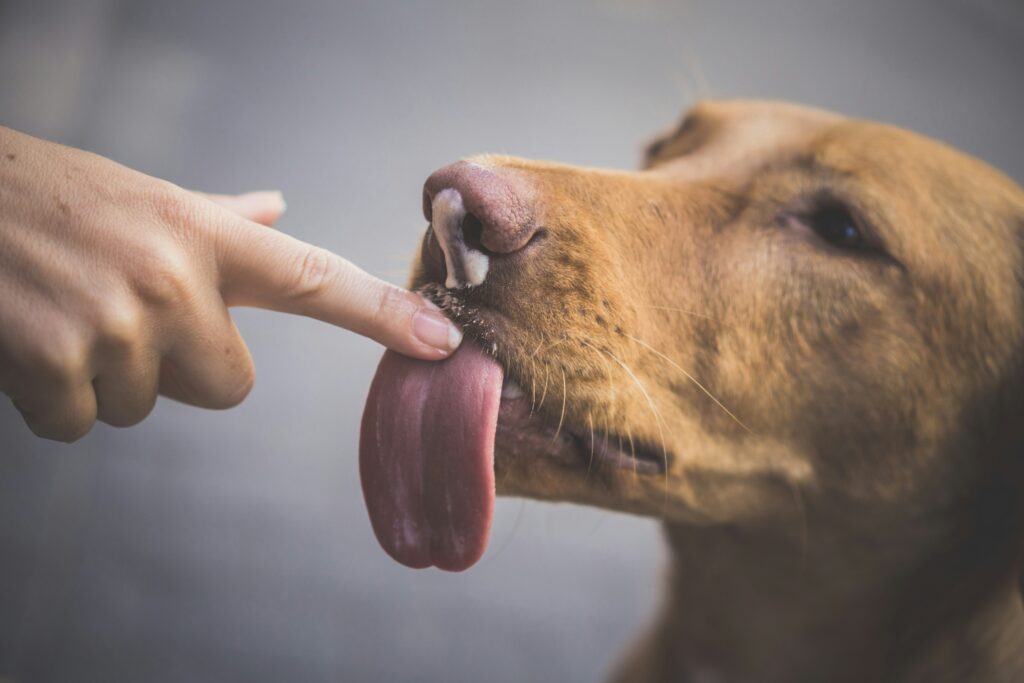
Recognizing Dogs Communication
Dogs use body language a lot to communicate with people and other animals and to show their feelings. Among the many subliminal indicators, they employ to express their emotions is lip-licking. To strengthen their relationship with their dogs and gain a deeper understanding of them, dog owners must learn to recognize these cues.
1. Wagging Tail and Position:
Dogs use their tails to communicate nonverbally and their posture in general, in addition to their dog licking lips a lot. A tail that wails can convey a range of emotions, including enjoyment, enthusiasm, and nervousness. It’s crucial to comprehend the surrounding body language and context. For instance, a low, wagging tail typically denotes submission or friendliness, but a high, stiff tail may signal vigilance or even violence.
2. The eyes and ears:
Additional clues about a dog’s emotional condition can be found in the way their ears are positioned and the look in their eyes. Ears that point forward frequently convey enthusiasm or interest, whereas flattened ears can convey fear or submission. Similar to this, wide-eyed looks might imply worry or attentiveness, but soft, relaxing eyes suggest relaxation.
3. Elevated Hackles:
The hairs on a dog’s back, known as raised hackles, are frequently connected to heightened emotions or arousal. It might be a sign of violence, but it can also happen out of excitement or fear. Deciphering the significance behind heightened hackles requires an understanding of the context and general body language.
4. Stretching and yawning:
Dogs can indicate their relaxation or release of tension by stretching or yawning. Aside from being an indication of exhaustion, yawning can also be a soothing cue in social situations. Dog owners can assess their pets’ emotional health and comfort levels by paying attention to these subtle indications.
5. Paw Raising and Petting:
Dogs may lift their paws or scratch themselves as a way to express discomfort or tension. When a dog elevates its paw or scratches excessively, it can indicate that there is an underlying problem, including pain, irritation, or allergies. By observing these behaviors, possible health issues can be avoided and prompt, timely care can be initiated.
6. Barking and speaking:
Canine vocalizations, such as growling, barking, or whining, are common ways for them to communicate. The meanings associated with each vocalization are distinct, and it is important to grasp the subtleties. For example, a deep, continuous growl can signal a threat or discomfort, whereas a high-pitched bark may indicate enthusiasm or fun.
7. Scent marking and sniffing:
Because of their keen sense of smell, dogs are able to detect scents in their surroundings and those of other animals. Urinating and scent marking are common forms of territorial communication. Comprehending these scent clues improves our understanding of the social and emotional terrain of dogs.
8. Mouth and Expressions on the Face:
A dog’s mouth and facial expressions can reflect a variety of emotions in addition to lip-licking. A calm, open mouth and a soft tail wag usually signify a content and kind temperament. On the other hand, discomfort, fear, or aggression may be indicated by a stiff jaw, exposed teeth, or a wrinkled muzzle.
9. Salutations and Signals of Play:
Dogs greet people and start games with distinct body language. A frequent play signal is to bow, with the front of the body dropped and the hindquarters elevated. Comprehending these nonverbal cues promotes harmonious relationships between canines and their human companions, as well as beneficial social interactions.
10. Turning Around:
Rolling over and revealing the belly can be interpreted as a sign of weakness or a need for tummy rubs. Nonetheless, under stressful situations, some dogs may roll over in a defensive position; therefore, it’s important to understand the broader context and accompanying signs.
Deepening the link between owners and their pets is a constant process that involves learning the complex language of a dog’s body. Dog owners who pay attention to these subtle signs can respond to their pets’ needs in a way that is suitable and build a connection based on mutual understanding, communication, and trust. We go on a trip that strengthens our bond with these amazing friends and enables us to respond to their emotional and physical needs with empathy and understanding as we unravel the complex web of canine body language.
Potential Causes of Compulsive Dog Licking Lips A Lot:
Anxiety and stress:
When a dog is nervous or stressed, they frequently lick their lips. A number of things, like alterations in their surroundings, being in an unknown place, or being around loud noises, can cause this behavior. In order to resolve this problem and provide your dog with a comfortable environment, it is essential to understand the underlying cause of stress.
Health Concerns:
Overindulgence in lip-licking may also indicate underlying health issues. dog licking lips a lot due to dental problems, mouth sores, or digestive troubles. To rule out any possible health concerns, it is essential to see a veterinarian if you observe a sudden change in your dog’s behavior.
Soreness or pain:
When dogs are in pain or uncomfortable, dog licking lips a lot. This may be the result of physical illnesses such as arthritis or trauma. If your dog is lip-licking, you can assess whether pain is the source by watching your dog’s overall body language and behavior.
Teething or an upset stomach:
When their stomachs are disturbed or they are feeling queasy, dogs frequently lick their lips. This may be your dog’s way of coping with discomfort if they have consumed something strange or are having digestive problems.
Signals from social media:
A frequent social signal used by dog licking lips a lot. When a dog interacts with people or other dogs, it may be an attempt to defuse tension or serve as a sign of submission. Excessive lip-licking may be your dog’s technique of showing deference if they are in a new social situation or are meeting new people.
Hunger or Waiting:
Dogs will occasionally lick their lips in expectation of food or goodies. This may be your dog’s natural reaction to the thought of a meal if it is hungry or anticipates a reward.
Irritations or allergies:
Like people, dogs may have allergies that cause rashes on their skin, among other symptoms. Overindulgence indog licking lips a lot may be an allergic reaction to discomfort or itching. Typical allergens include dust mites, specific foods, and even the materials in your dog’s bedding. Consulting with a veterinarian can help identify the exact triggers and design an appropriate care strategy if you believe allergies, are the cause.
Compulsive Conduct:
Excessive lip-licking is one of the obsessive behaviors that some dogs develop. Stress, lack of mental stimulation, or boredom are common causes of compulsive behaviors. Treating your dog to puzzle toys, regular exercise, and a stimulating environment will help reduce obsessive behaviors.
Dental Issues:
When gum disease, teeth decay, or abscesses are present in their mouths, dog licking lips a lot excessively. Dental issues can cause discomfort and influence behavior and eating patterns. Frequent dental examinations and good oral hygiene can improve your dog’s general health and lessen discomfort.
Trauma or Fear:
Dogs who have been abused in the past or who have suffered trauma may dog licking lips a lot excessively in reaction to fear. It’s imperative to handle these situations with kindness and compassion. Over time, fear-related behaviors can be lessened by fostering a safe and nurturing environment and establishing trust through positive reinforcement.
Adverse Drug Reactions:
A number of side effects, including behavioral abnormalities, are possible with several drugs. It’s best to speak with your veterinarian if your dog has recently begun a new treatment regimen and you notice that lip-licking has increased. It could be essential to change the dosage of a prescription or look into other solutions in order to lessen adverse effects.
Control of temperature:
Dogs regulate their body temperature through panting and other actions; unlike humans, they do not sweat. It’s possible that excessive lip-licking is a component of their natural cooling process, especially in warm weather. Other considerations should be made, though, if your dog is habitually licking its lips indoors or in colder weather.
Changes in Hormones:
Hormonal fluctuations can affect behavior, especially in intact (non-neutered) dogs. Increased dog licking lips a lot may be seen in female dogs in heat or in male dogs who detect a female dog close in estrus. Although this behavior is typical of mating habits, it is important to keep an eye on your dog’s general health throughout these hormonal changes.
Insufficient Socialization
Unsocialized dogs may exhibit signs of tension and anxiety when they are in new environments. Overindulgence in lip-licking may be an indication of nervousness when engaging with strangers or in unfamiliar settings. Confidence-boosting techniques like gradual exposure and positive reinforcement might help lessen stress-related behaviors.
A comprehensive understanding of the complex nature of excessive dog licking lips a lot is necessary. Dog owners can more effectively assess their pets’ behaviors and take proactive measures to solve any underlying concerns by taking into account the numerous elements stated. Our dogs’ general well-being is influenced by regular veterinary checkups, a healthy, stimulating environment, and a kind attitude toward training. Our dedication to comprehending and fulfilling our dogs’ requirements as responsible pet owners creates a solid and peaceful relationship that endures a lifetime.
How to Deal with Too Much Lip-Licking
Instruction in Behavior:
To alleviate excessive lip-licking, positive reinforcement measures must be used. Use rewards or praise to reinforce behavior that is calm and collected. If your dog licking lips a lot because they are stressed, you should reward them for being calm and gradually introduce them to the source of their worry in a controlled way. Reinforcing positive actions and assisting your dog in associating particular situations with favorable results require consistency.
Expert Instruction and Guidance:
Make sure the space where your dog lives are stress-free and cozy. Give your dog a special, comfortable area to retire to when they’re feeling overwhelmed. Comfortable bedding, toys, and blankets are examples of familiar items that might foster a sense of security and lessen the chance of stress-related behaviors like excessive lip-licking.
Frequent Exercise and Cognitive Excitation:
For a dog to remain healthy and to have a balanced state of mind, they must exercise. Take your dog on frequent walks, playdates, and mental-stirring activities. Interactive games or puzzle toys can provide mental stimulation, which helps lessen obsessive habits like excessive lip-licking and relieve boredom.
Dental Health:
Getting regular dental treatment is essential for treating tooth problems that could be causing excessive lip-licking. To encourage dental health, give your dog dental chews or toys, and brush their teeth on a regular basis. See your veterinarian for expert dental examinations and cleanings, particularly if you think your pet’s discomfort may be related to oral issues.
Medical Intervention:
If your pet exhibits persistent, excessive lip-licking or other worrisome symptoms, get a full evaluation by consulting with your veterinarian. Medical conditions, including allergies, digestive disorders, or pain, may call for certain treatments or drugs. Effective behavior resolution requires addressing the underlying problem.
Think about nutrition and diet:
Make sure your dog is getting enough nourishment from their meal by reviewing it. Certain components may cause allergies or sensitivities in certain dogs, which can cause discomfort or digestive problems. See your veterinarian about any dietary adjustments that might improve your pet’s general health and wellbeing.
Keep an eye on social interactions:
If your dog’s excessive lip-licking is associated with social situations, keep an eye on how your dog interacts with people and other animals. Reducing anxiety-related behaviors can be achieved through positive reinforcement, gradual exposure, and building good associations with socialization. If necessary, get advice from a qualified trainer to promote constructive social connections.
Understanding and Patience:
Excessive lip-licking calls for tolerance and comprehension. Reprimanding someone can make their anxiety- or fear-related actions worse, so avoid it. Rather, concentrate on developing a loving atmosphere, providing positive reinforcement, and strengthening your relationship with your dog. Positive, regular encounters foster trust and make your dog a happier, healthier friend.
conclusion
In conclusion, while a dog’s occasional lip-licking is typical behavior, persistent lip-licking may indicate a problem that needs to be addressed. The first step in giving your dog the care and assistance they need is to comprehend the causes of their behavior. When in doubt, get advice from a veterinarian to protect your dog’s health and well-being.
FAQS (Frequently Asked Questions)
Should I be worried if my dog keeps licking his lips?
While your dog may occasionally lick its lips, frequent lip-licking could be a sign of discomfort or nausea. Check for additional indications of distress and seek advice from a veterinarian if the behavior doesn’t go away.
Why is my dog licking his lips and gulping?
Dogs that lick their lips and gulp may be experiencing nausea, digestive problems, or discomfort. See a veterinarian to make sure there are no underlying medical conditions.
Do dogs lick their lips when nauseous?
Yes, when a dog feels queasy, they frequently lick their lips to express how uncomfortable they are. It might indicate a possible illness or digestive problem.
Why is my dog licking the air and gulping?
In dogs, air licking and gulping may be signs of nausea, gastrointestinal distress, or a foreign object lodged in the throat. See a veterinarian to determine and treat the underlying problem.
Why is my dog licking his lips and trying to throw up?
Dogs that lip-lick or try to throw up may be experiencing digestive distress, may have consumed something toxic, or may have an underlying medical condition. See a veterinarian right away to evaluate and treat the issue.
What are signs of nausea in dogs?
Dogs that are experiencing nausea may lick their lips excessively, drool a lot, refuse to eat, throw up, or exhibit behavioral abnormalities. See a veterinarian for a proper diagnosis and treatment if these symptoms continue.
Do dogs lick their lips when in pain?
Indeed, dogs who are in pain may lick their lips to indicate their stress or discomfort. Observing additional behavioral cues and consulting a veterinarian are crucial for appropriate assessment and care.
How do I stop my dog from licking his lips?
Determine the root of your dog’s lip-licking behavior and take appropriate action, such as treating dental problems or gastrointestinal discomfort. Speak with a veterinarian for advice and potential ways to help with the behavior.
Do dogs lick a lot when sick?
Indeed, when sick, dogs may lick excessively to relieve themselves of discomfort or nausea. A visit to the veterinarian is necessary for an accurate diagnosis and course of treatment if the persistent licking is accompanied by other symptoms.
why is my dog licking the couch?
Dogs that lick the couch may be exhibiting symptoms of anxiety, boredom, or sensory seeking. Give your pet both mental and physical stimulation, and if the behavior doesn’t go away, think about speaking with a veterinarian or a qualified trainer.
why does my dog keep licking the floor?
Dogs that lick the floor may have digestive problems, nutritional deficiencies, or behavioral habits. To rule out any health issues and treat the underlying cause, speak with a veterinarian.
how to stop dog from licking paws home remedy?
Use a pet-safe anti-lick spray or dab paws with a solution of apple cider vinegar and water to discourage dogs from licking their paws. Make sure your dog’s paws are clean and dry as well. See a veterinarian if there are any underlying causes, such as allergies or skin conditions.
dog obsessively licking?
Dogs who lick themselves compulsively may be experiencing stress, anxiety, boredom, or discomfort. Find and treat the underlying cause of the behavior, and seek the advice and appropriate evaluation of a veterinarian if it continues.
licking county dog shelter?
Located in Licking County, Ohio, the Licking County Dog Shelter offers support, care, and adoption services for dogs. For information on available dogs and the adoption process, get in touch with the shelter directly if you’re interested in adopting or if you need assistance.
how to stop dog from licking paws?
Determine and treat any underlying problems, such as allergies or skin irritations, to prevent your dog from licking its paws. To ensure appropriate diagnosis and treatment, clean the paws, use a pet-safe anti-lick spray, and speak with a veterinarian.
why is my dog licking the floor?
Dogs that lick the floor could have a medical condition, such as nausea or gastrointestinal distress. See a veterinarian to rule out any health issues and deal with the root cause.
why is my dog licking me so much?
Dogs may lick their owners in an attempt to get attention, show affection, or submit. Overindulgence in licking may also be a sign of anxiety or a learned behavior. Pay attention to other cues and seek advice from a veterinarian or a professional trainer if necessary.
my dog keeps licking his paws?
Dogs that lick their paws frequently may be suffering from allergies, skin irritation, or boredom. Speak with a veterinarian to identify the root cause and create an appropriate care strategy.

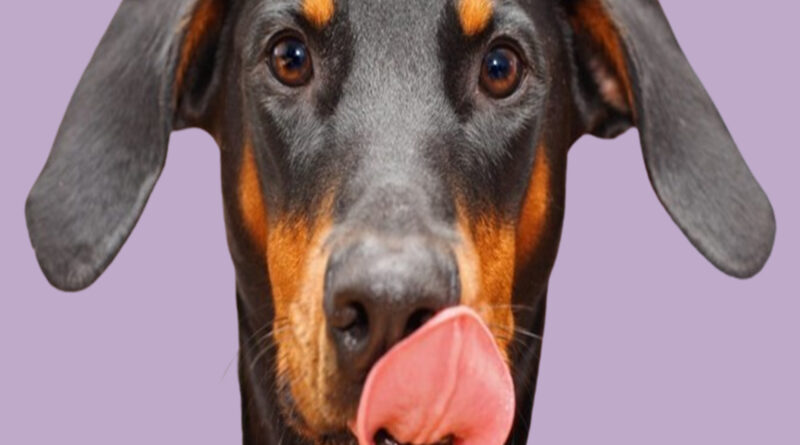
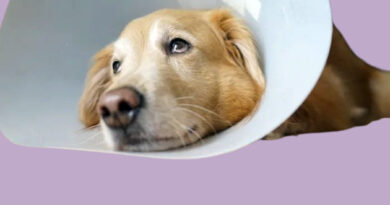
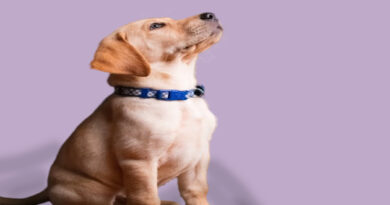
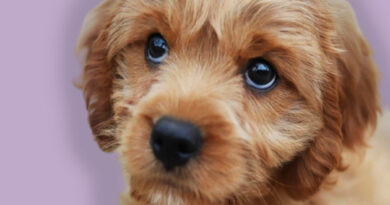
Your articles are extremely helpful to me. May I ask for more information?
definitely! We’re happy our articles are useful. Feel free to ask any questions or specify the information you’re searching for, and we’ll be pleased to assist you further. Thanks for your support!
Thank you for your articles. I find them very helpful. Could you help me with something?
You’re welcome! I’m here to help. Feel free to ask your question, and I’ll do my best to assist you.
Sustain the excellent work and producing in the group!
Thank you for providing me with these article examples. May I ask you a question?
Thank you for writing this post!
Helpful information. Fortunate me I discovered your website by chance, and I am shocked why this coincidence did not came about earlier! I bookmarked it.